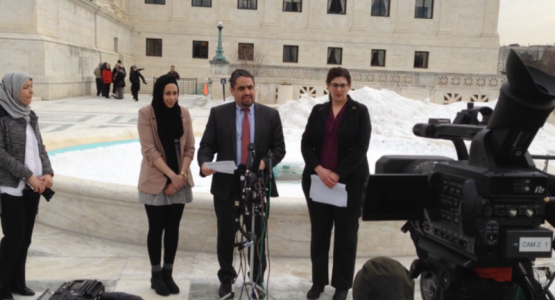
U.S. Supreme Court Rules Abercrombie Discriminated Against Applicant in Workplace Religious Discrimination Case
The U.S. Supreme Court voted 8-1 this week, in favor of a case that examined whether an employer could refuse to hire an applicant based on their religious practices and observances. The Seventh-day Adventist Church filed an amicus brief, or friend of the court brief with other faith groups, in the case of Equal Employment Opportunity Commission v. Abercrombie and Fitch Stores, Inc.
“We are extremely pleased with today’s opinion. It was a good decision for religious liberty, not just Samantha Elauf, but people of all faiths,” says Todd McFarland, associate general counsel for the Adventist world church. “We are also pleased that the Court, in its opinion, relied upon arguments the Adventist Church raised in our amicus brief.”
Church leaders are encouraged the Supreme Court reinforced the importance of religious liberty and hope the decision will lead to additional protections for employees and job applicants.
“As this is the first religious accommodation case to be heard by the Supreme Court in nearly three decades, we were hopeful that this ruling would protect the rights of people of faith in the workplace,” says Dwayne Leslie, director of legislative affairs for the Adventist world church. “Therefore, we were pleased to see the Court strongly state in the issued opinion that “An employer may not make an applicant’s religious practice, confirmed or otherwise, a factor in employment decisions.”
The case involved seventeen-year-old Samantha Elauf, who was denied a job because her hijab, a head covering, violated corporate policy. Adventist feared that a ruling against Elauf could erode workplace religious freedom rights, including those of Adventists who choose not to work on Saturday, the biblical Sabbath.
Church legal counselors were also concerned with a violation of the Title VII of the Civil Rights Act, which obligates employers to take steps to “reasonably accommodate” a prospective employee’s “religious observance or practice.”
The case stems from a 2008 incident in which Elauf wore a hijab when applying for a sales position at an Abercrombie & Fitch store in Tulsa, Oklahoma. After a manager confirmed with a supervisor that Elauf’s headwear violated store policy, she was deemed ineligible for hire without discussion of religious accommodation.
The U.S. Equal Employment Opportunity Commission, which filed a lawsuit on Elauf’s behalf, said the move defied Title VII. While a federal judge sided with the EEOC in 2011, the 10th Circuit Court of Appeals in Denver upended that decision last year, claiming Elauf never told Abercrombie she needed a religious accommodation, even though she was wearing a hijab in the interview.
And that, Adventist legal counselors said, places undue responsibility on the applicant to determine whether her religious beliefs or practices conflict with company policy.
The Church’s amicus brief pointed out that “Frequently, an applicant will be unaware of a work-religion conflict simply because of her inferior knowledge of the employer’s work requirements.”
Also, a hiring process can be technologically structured so that an employee can’t raise the issue of potential conflict, such as online applications asking applicants which days of the week they are available to work, McFarland said in a previous statement to Adventist News Network.
Religious clothing and the observance of Sabbath and other holy days are the most common areas of conflict in the workplace, McFarland said. Hijabs, turbans, yarmulkes and other head coverings frequently conflict with a company’s “look” policy, while Sabbath observance can clash with scheduling.
Image Caption: Samantha Elauf (left) and David Lopez, general counsel for the EEOC (right) stand outside the U.S. Supreme Court after oral arguments in February 2015. Photo credit: Garrett Caldwell

Add new comment